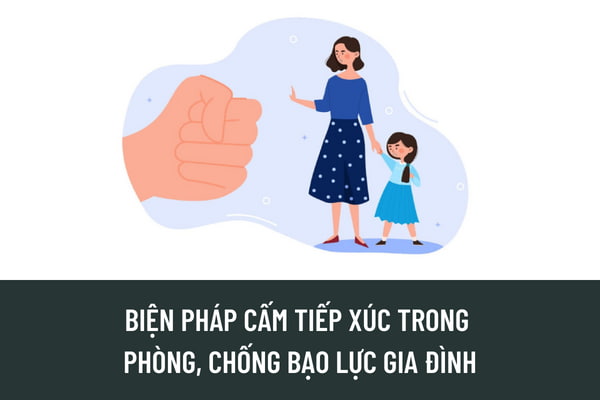What are the Measures for Prohibition of Contact in the Prevention and Control of Domestic Violence? What are the Conditions for the Chairman of the Commune-level People's Committee to Issue a Contact Prohibition Decision?
What is a contact prohibition measure in preventing and combating domestic violence?
According to the provisions of Article 8 Decree 08/2009/ND-CP, the measure of prohibiting contact with domestic violence victims involves not allowing a person who has committed acts of domestic violence to perform the following actions:
- Approach the victim within a distance of less than 30 meters; except in cases where there is a physical barrier such as a wall, fence, or other separators ensuring the safety of the victim.
- Use phone, fax, email, or other communication means to carry out acts of violence against the victim.

What is a contact prohibition measure in preventing and combating domestic violence? What are the conditions for the chairman of the commune-level People's Committee to issue a contact prohibition decision?
What are the conditions for the chairman of the commune-level People's Committee to issue a contact prohibition decision?
According to the provisions of Article 9 Decree 08/2009/ND-CP, the Chairman of the commune-level People's Committee where domestic violence occurs can decide to prohibit the perpetrator from contacting the domestic violence victim for a period not exceeding 03 days when the following conditions are met:
- There is an application from the domestic violence victim, the guardian, or legal representative, or the competent authority or organization; in the case of an application from the competent authority or organization, it must be with the consent of the domestic violence victim;
- Acts of domestic violence have caused harm or threatened to cause harm to the health or life of the domestic violence victim;
- The perpetrator and the domestic violence victim have different residences during the period of contact prohibition.
Notably:
- The competent authority or organization as per the regulation includes the Department of Culture, Sports, and Tourism; the Department of Labor, Invalids, and Social Affairs; the Police; the workplace of the victim, or the political-social organization or social organization of which the victim is a member.
- Acts of domestic violence as per the regulation are identified based on one of the following:
+ A certification from a medical facility on the examination and treatment of injuries caused by domestic violence;
+ Visible injuries on the victim’s body, evident to the naked eye, or clear signs of mental panic in the domestic violence victim;
+ Evidence proving threats to the health or life of the domestic violence victim.
- Different residences include the homes of relatives, friends, trusted places, or other residences to which the domestic violence victim voluntarily moves.
Note: When applying the contact prohibition measure, priority must be given to protecting the legitimate rights and interests of children, women, the elderly, and the disabled.
Additionally, Clause 6 Article 9 Decree 08/2009/ND-CP stipulates exceptional cases where the perpetrator of domestic violence is allowed to contact the domestic violence victim after reporting to the head of the residential community where the victim resides, including:
- Family funerals or weddings;
- Family member suffering an accident or severe illness;
- Heavy damage to family property due to natural disasters, fire, or epidemics;
- Other cases requiring contact as per the good customs and traditions of the local community.
Does the court have the authority to issue a contact prohibition decision?
According to the provisions of Article 21 Law on Domestic Violence Prevention and Control 2007, the court handling or resolving a civil case between the domestic violence victim and the perpetrator can decide to apply the contact prohibition measure for a period not exceeding 4 months when the following conditions are met:
+ There is an application from the domestic violence victim, the guardian, or legal representative, or the competent authority or organization; in the case of an application from the competent authority or organization, it must be with the consent of the domestic violence victim;
+ Acts of domestic violence have caused harm or threatened to cause harm to the health or life of the domestic violence victim;
+ The perpetrator and the domestic violence victim have different residences during the period of contact prohibition.
- The contact prohibition decision takes effect immediately after signing and is sent to the perpetrator, the domestic violence victim, the Chairman of the commune-level People's Committee, the head of the residential community where the domestic violence victim resides, and the concurrently ranked People's Procuracy.
- The People's Court that issued the contact prohibition decision can annul it upon receiving an application from the domestic violence victim or when it deems the measure no longer necessary.
- In the case of family funerals, weddings, or other special instances wherein the perpetrator of domestic violence and the victim must contact one another, the perpetrator must report to the head of the residential community where the domestic violence victim resides.
- The authority, procedure, and process of applying, amending, or annulling the contact prohibition measure stipulated in this Article are implemented similarly to the regulations of civil procedure law regarding urgent temporary measures.
LawNet
